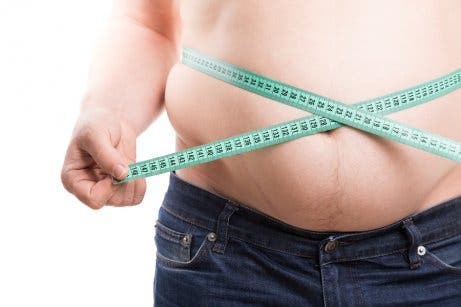8 Supplements for Treating Obesity

Currently, excess weight and obesity are two problems of global importance, together with related complications such as cardiovascular disease or diabetes. Being overweight is detrimental to your health in the medium and long term. The good news is that you can change this situation with proper nutrition and regular exercise.
In this article, we’ll tell you which are the best natural supplements for treating obesity. Remember to include them in your lifestyle plan along with a balanced diet and exercise.
Treating obesity

Before diving fully into this topic, let’s discover what exactly being overweight means. An abnormal accumulation of fat in the body is the definition of being overweight. When this accumulation is excessive and harmful to health, we’re talking about obesity.
According to data from the World Health Organization (WHO), more than 1.9 billion people over the age of 18 were overweight in 2016. Of these, more than 650 million were obese.
Now, are there natural supplements for treating obesity? First of all, we should establish that natural supplements include vitamins, minerals, and herbs that you usually take as capsules. You can also consume them as a powder or in the form of drinks.
Before commenting on the most used natural supplements to lose weight, we need to clarify that the fact that they’re called “natural” doesn’t mean you can consume them indiscriminately and without medical control. On the contrary, before starting to take any supplements, you should always consult your doctor!
Common ingredients in natural supplements

Below, we’ll discuss the main ingredients used in natural supplements for treating obesity.
1. Chitosan
This product is a derivative of fish that many people use for treating obesity. Specifically, it’s the sugar that comes from the outer skeleton of shrimp, crab, and lobster.
It’s supposed to prevent the absorption of cholesterol and fats by the body. However, there are no conclusive studies on its effectiveness in reducing body fat.
You might be interested in: Linseed: a Natural Weight Loss Alternative
2. Glucomannan for treating obesity
This substance comes from the Konjac plant and is supposed to aid weight loss due to its natural fiber content. However, a Journal of Obesity study concluded that this supplement actually didn’t help achieve weight loss. Consult your doctor about it.
3. Green tea extract

This is an herbal supplement for weight loss that you can find in almost any pharmacy. Different studies have endorsed its effectiveness, with different degrees of weight loss. An example is the one published in the journal Hospital Nutrition, where the ingesting green tea is related to a reduction of fatty tissue.
4. Raspberry Ketone for treating obesity
Raspberry is an ingredient in many pills since it’s supposed to help burn fat. As with the other substances mentioned, there is no scientific evidence (at least in humans) to support this claim.
5. Bitter orange
Bitter orange is one of the most common ingredients in natural weight loss supplements. It’s supposed to help burn more calories, however, there’s also no research with conclusive data on its effectiveness.
In fact, some surveys of bitter orange users indicate the possibility of increased anxiety, heart rate, and blood pressure, in addition to chest pain.
6. Chromium Picolinate

Chromium is a mineral that works by improving the body’s response to insulin so that it converts food into energy. It’s usually recommended for its supposed effect of burning fat and increasing muscle mass while reducing appetite. It’s worth noting that different studies couldn’t prove these benefits.
7. Conjugated Linoleic Acid (CLA)
Specialists suspect that linoleic acid could help reduce body fat and decrease appetite. Data from studies conducted in this regard are controversial. An example is the one published in the Journal of the International Society of Sports Nutrition, where the found no solid evidence to support the claims.
While some admit weight loss thanks to the use of this substance, others maintain that it doesn’t really help at all.
Read also: 5 Fruits for Healthy Weight Loss and How to Eat Them
8. Caffeine for treating obesity
The last component of natural supplements that we’ll talk about today is caffeine. Some studies have shown that caffeine could speed up your metabolism, increasing fat burning by up to 29%. However, other research has shown minimal weight loss when using caffeine for treating obesity.
Note: Unlike medications, natural supplements are not subject to such strict controls. Although the FDA (Food and Drug Administration) regulates them, it considers them to be «food». Therefore, the companies that produce them don’t have to prove their safety or effectiveness before they go on sale.
Do Natural Supplements Help Obesity Treatment?

The reality is that the currently available information is controversial. Some studies assure that there could be a small amount of weight loss when taking natural supplements; however, they also point out the side effects. Other research claims that the mentioned substances are not effective.
We advise you to change your eating habits and start a regular exercise routine to combat excess weight and obesity healthily. It’s the best way to do it!
As always, we recommend you avoid consuming supplements without consulting your doctor. If you’re looking for obesity treatment, avoid self-medication. Remember that you should always seek advice from a specialist before changing any habit that could affect your health.
All cited sources were thoroughly reviewed by our team to ensure their quality, reliability, currency, and validity. The bibliography of this article was considered reliable and of academic or scientific accuracy.
- Keithley JK., Safety and efficacy of glucomannan for weight loss in overweight and moderately obese adults. Journal of Obesity, 2013.
- Vázquez Cisneros LC., López Uriarte P., López Espinoza A., et al., Effects of green tea and its epigallocatechin (EGCG) content on body weight and fat mass in humans: a systematic review. Nutr Hosp, 2017. 34 (3): 731-737.
- Lehnen TE., Ramos da Silva M., Camacho A., Marcadenti A., et al., A review on effects of conjugated linoleic fatty acid (CLA) upon body composition and energetic metabolism. J Int Soc Sports Nutr, 2015.
This text is provided for informational purposes only and does not replace consultation with a professional. If in doubt, consult your specialist.








